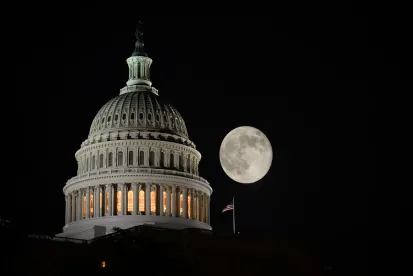On June 3, 2020, House Transportation and Infrastructure Committee Chairman Peter DeFazio (D-OR) unveiled the Investing in a New Vision for the Environment and Surface Transportation in America Act, or the “INVEST in America Act.” The bill is the first legislative proposal stemming from the “Moving Forward Framework,” a 19-page document outlining House Democratic priorities for infrastructure legislation released in January. The INVEST in America Act would reauthorize the Fixing America’s Surface Transportation (FAST) Act, which expires on September 30, and authorize $494 billion in federal spending over five years in an effort to address a variety of infrastructure concerns within the jurisdiction of the Transportation and Infrastructure Committee.
The INVEST in America Act includes robust climate related policies and funding aimed at reducing greenhouse gas emissions. While the bill is limited to policies within the Committee’s jurisdiction, the initial blueprint provided in the Moving Forward Framework compiled work from other committees that may be attached later in the legislative process. Most notably, the proposal does not address how to pay for the provisions included in the bill, an issue that continues to complicate the prospects for infrastructure legislation during this Congress despite bipartisan and bicameral interest.
The remainder of this alert will highlight the key components of the INVEST in America Act, with particular focus on climate-related provisions, and outline the next steps and outlook for consideration of the bill in the House of Representatives.
Legislative Overview
The INVEST in America Act would authorize $494 billion in funding for infrastructure programs, including $319 billion for federal highways, $105 billion for mass transit, and $60 billion for rail transit. The 864-page bill would also make a series of important policy changes. It would require federal highway funds to focus on repairing existing highways before constructing new highway capacity; strengthen Buy America procurement requirements for highways, mass transit, and rail; implement new safety requirements across all transportation modes, and; update the deadline by which the Department of Transportation is required to issue regulations to ensure the coordination of projects within the highway right-of-way with broadband infrastructure deployment projects. Because raising the federal gas tax to pay for infrastructure improvements remains politically unpopular, the bill would also establish a national Vehicle Miles Traveled (VMT) pilot program across all 50 states to develop a sustainable funding mechanism for the Highway Trust Fund.
The bill would also authorize $83.1 billion in funding for state, cities, Tribes, territories and transit agencies to administer programs, advance projects, and preserve jobs in the wake of the COVID-19 pandemic. It also delays the implementation of many policy changes included in the bill to Fiscal Year 2022 to allow entities more flexibility to recover from the pandemic.
Consistent with direction from House leadership and with action from other House committees, the INVEST in America Act has a strong focus on addressing climate change. Climate-related provisions in the bill include the following:
-
Addition of “Combating climate change” to the list of national goals for the Federal-aid highway program;
-
Requirement that the Department of Transportation establish measures for states to assess CO2 and other greenhouse gas emissions per capita on public roads. The bill would also forbid states from setting regressive emissions targets;
-
$8.3 billion authorization for a new carbon pollution reduction apportionment program to reduce greenhouse gas emissions from highway, transit, and rail projects;
-
$1.75 billion authorization for alternative fuel charging infrastructure;
-
$1.725 billion authorization for zero emission buses;
-
$105 billion authorization across all modes of transit;
-
$6.25 billion authorization to support a new pre-disaster mitigation program focused on the impacts of climate change and extreme weather on infrastructure;
-
Establishment of a research, development, and deployment program focused on low-carbon materials for use in highway construction.
A section-by-section summary with additional information on the INVEST in America Act can be found here.
Next Steps
The House Transportation and Infrastructure Committee will hold a markup to consider the INVEST in America Act on Wednesday, June 17 and the House could consider the bill as early as July 1. Other unintroduced legislative proposals to advance priorities outlined in the Moving Forward Framework may also be considered in early July.
Upon release of the bill, House Republicans expressed concern that the bill was drafted without input from the Republican conference, a departure from typical practice within the Transportation and Infrastructure Committee. Chairman DeFazio said this week that the bill represents Democratic infrastructure priorities and that Republican resistance to climate-related provisions played a role in the Committee’s decision to not substantively engage the minority on the bill. However, Chairman DeFazio indicated a willingness to work with Republicans on the bill in the time between the Committee markup and floor consideration.
Surface transportation provisions authorized under the 2015 FAST Act are set to expire on September 30, giving lawmakers a deadline by which they will need to pursue a short-term extension of FAST Act provisions or enact new surface transportation legislation. The Senate Environment and Public Works Committee has already unanimously passed its own surface transportation bill, the America’s Transportation Infrastructure Act (S. 2302), through Committee that awaits consideration by the full Senate. Similarly, the Trump Administration is likely to release its own infrastructure proposal in the coming weeks.
The COVID-19 pandemic also provides a noteworthy lens through which to view House consideration of the bill. After gaining significant momentum in April, the prospects for a comprehensive infrastructure bill as a means of stimulating the economy amid the pandemic and the resulting economic crisis have dimmed in recent weeks. Whether sufficient momentum exists to enact a broad infrastructure-related stimulus bill will depend on both the impact of funding delivered via prior coronavirus relief bills and the state of the economy through the summer, as both Senate and House Republicans are taking a wait-and-see approach to additional spending.





 />i
/>i

